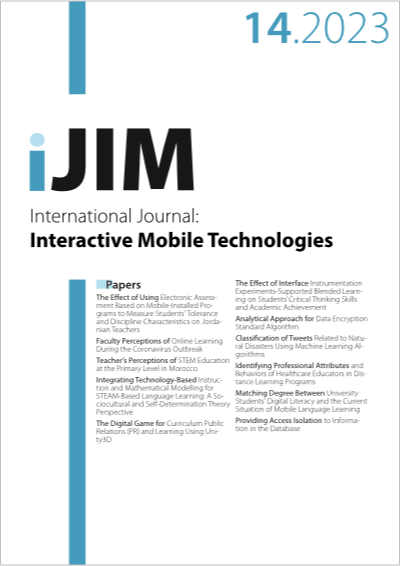The Effect of Interface Instrumentation Experiments-Supported Blended Learning on Students’ Critical Thinking Skills and Academic Achievement
DOI:
https://doi.org/10.3991/ijim.v17i14.38611Keywords:
Interface instrumentation experiments, blended learning, critical thinking skills, academic achievementAbstract
This study aims to promote students’ critical thinking skills and academic achievement using Interface Instrumentation Experiments-supported Blended Learning (IIE-BL). In this quasi-experimental study, 40 undergraduate students who took the Basic Physics II course from the Department of Physics Education at two private universities in Indonesia were assigned randomly as experimental and control groups. Experimental group students were taught using blended learning based on interface instrumentation technology, while the control group students were taught using conventional learning by the same lecturer. To collect data, the Critical Thinking Test (CTT) and Physics Achievement Test (PAT) were administered, which data were then analyzed in independent and paired t-tests, as well as the d-effect sizes test on SPSS 26 at a significance level of 0.05. The results showed that students in the experimental group obtained significantly higher critical thinking skills and achievement scores than students in the control group. It can be concluded that IIE-BL is effective in improving students’ critical thinking skills and achievement in the Basic Physics II course. Educators are suggested to apply IIE-BL to promote student performance and catalyze their learning.
Downloads
Published
How to Cite
Issue
Section
License
Copyright (c) 2023 M. Firman Ramadhan, Mundilarto Mundilarto , Ariswan Ariswan, Irwanto Irwanto, Bahtiar Bahtiar, Syifa’ul Gummah

This work is licensed under a Creative Commons Attribution 4.0 International License.



